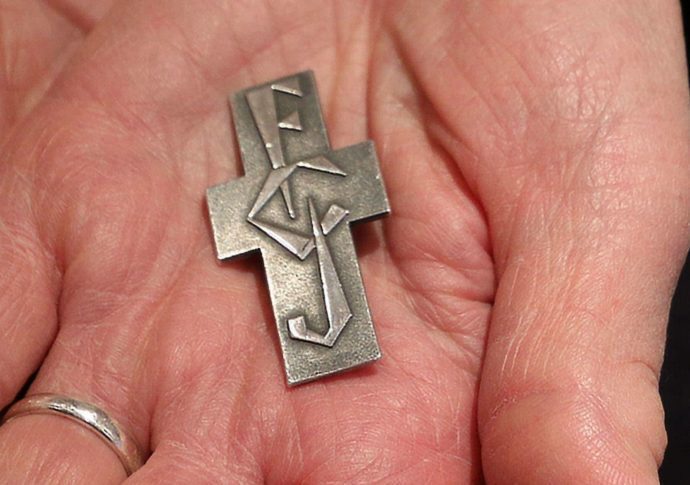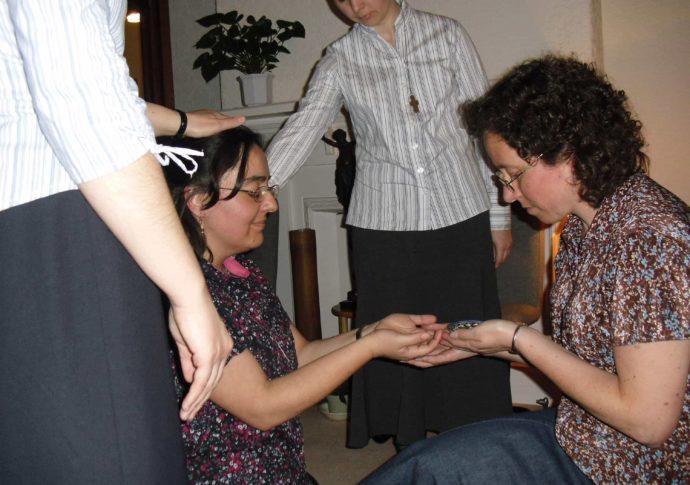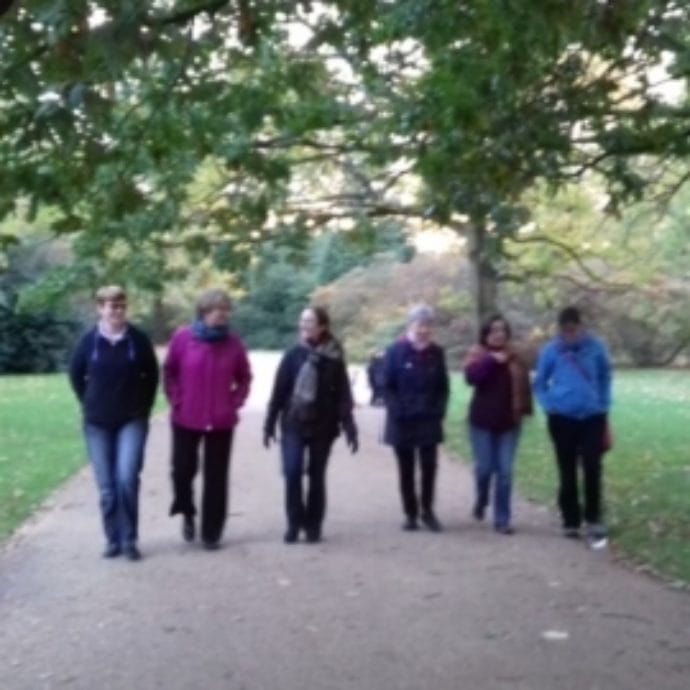Sr Bonnie Moser, fcJ, General Superior, wrote to all FCJ Sisters for the Feast of the Sacred Heart.
20 June 2025
Very dear Sisters,
As the Feast of the Sacred Heart approaches on June 27, I want to share with you an article written recently by Teresa White fcJ, called The Human Heart of God. I am aware of Teresa’s appreciation of Pope Francis’ most recent encyclical, Dilexit Nos, so her research and reflection on the Heart of Jesus is a treasure for all of us to ponder. The recent death of Pope Francis on Easter Monday makes The Human Heart of God even more timely. Much gratitude is extended to Teresa for her talent and willingness to help inspire us on this special Feast Day.
The Human Heart of God
Is the Sacred Heart of Jesus, honoured in the Church as an image of the love of God, still meaningful today? Or is it irrelevant in a world where God is rarely mentioned, God’s presence often ignored? At the very beginning of Dilexit nos, Pope Francis ponders such questions, but goes on to say that he believes this devotion could help us to rediscover the values of the heart. If love is a spiritual force drawing us to contemplate and encounter the infinite in the finite, the invisible and ineffable mystery in the human heart of Jesus the Nazarene (DN 64), then to reflect on the deeper meaning of the heart in the midst of the haste and noise and pressures of life in a Godless world could be important for all of us.
Far from being a difficult subject to approach, the spiritual meaning of the heart as a symbol of love is widely accepted, even in the atheistic atmosphere of our times. We see emoji hearts pasted on emails and text messages, hearts scribbled on hoardings, strings of hearts festooned in gardens and houses to celebrate birthdays, engagements and weddings, heart-shaped wreaths at funerals .… So, yes, the heart is universally acknowledged as a visible sign of the invisible reality of love, and love possesses a transcendent quality that carries us into the proximity of God. Love is not simply one of God’s attributes; it is God’s very name, God’s essence. Wherever there is love, God is present. Ubi caritas et amor, Deus ibi est.
According to Francis, the heart is the locus of our personal encounter with the Lord (DN 103), a sacred sign of God’s love embracing our human history. When we enter the milieu of love, of personal intimacy with God and others, we come to realise that “… the most beautiful things in the world cannot be seen or touched, they are felt with the heart.”[1] We can face pain, suffering, hardship, even persecution, if we know in our heart of hearts that we are loved. Everyone who loves us does us good, and shapes our souls for heaven. And the same is true for those we love. A look, a gesture, a smile, a tear, a gift, a touch, an indefinable lightness or sympathy in the texture of a human voice, a playful joke – these signs of heartfelt affection communicate something of the loving kindness which is the fruit of God’s presence in our lives. Intimacy, the proper activity and domain of the heart, creates true closeness between two persons (DN 12).
Intimacy, the proper activity and domain of the heart, creates true closeness between two persons.
Pope Francis, Dilexit Nos, 12
Love desires and seeks mutuality – when we love someone, we long for them to love us too. Is this true of God? Is even God’s love ‘incomplete’ until we accept it and love the Giver in return? St Ignatius’ prayer at the end of the Spiritual Exercises expresses the reciprocal nature of the gift of love: Thou hast given all to me. To Thee, Lord, I return it .… Give me Thy love and Thy grace, for this is sufficient for me. Marie Madeleine echoes this prayer when she urges us to respond to Jesus’ thirst to love and be loved and to unfold to others the depth of the riches of the heart of God. [2] Having experienced the loving kindness of God ourselves, we are called to share that love: Love one another; just as I have loved you, you also must love one another. By this love you have for one another, everyone will know that you are my disciples (John 13: 34, 35).
‘God is love’ is the core of the Good News that Jesus came to bring, and our Christian vocation is to reveal the loving face of God as we take our place in a struggling Church in the violent, destructive, war-torn world of today. The heart of Jesus is God’s heart, reaching out in love, leading us beyond hatreds, enmities, lies and broken promises, and opening us to the tenderness of life. Love is our God-given identity, and through it alone do we become fully ourselves. Without love, we cannot easily survive infancy, and as we grow older, physical and mental anguish visits us if as day follows day, we have no expectation of loving kindness. Through love we become, in a complete and luminous way, the persons we were meant to be, for every human being is created above all else for love. In the deepest fibre of our being, we were made to love and be loved (DN 21).
In today’s heartless world where people’s sense of their worth appears increasingly to depend on what they can accumulate with the power of money (DN 218), our only mission is to spread God’s love by the things we do and the way we live. The most trifling act of loving kindness enhances the innate power of love that is in our hearts and souls. An affectionate glance, a friendly smile, a helping hand, a promise kept out of love, warm-hearted understanding shown to someone carrying heavy burdens – these acts may touch and change the lives of others; certainly, they change us. Love, said Oscar Romero, is the force that will overcome the world, and that is what Jesus came to do: to transform the world through love.
Love, said Oscar Romero, is the force that will overcome the world, and that is what Jesus came to do: to transform the world through love.
Francis admits that it is not easy to enter into the mystery of love, living as we do in an age of superficiality, rushing frenetically from one thing to another … unconcerned about the deeper meaning of our lives (DN 2). Perhaps we need to slow down, to pause and listen to the silent music beneath the noise. If we are to live by the values of the heart, he suggests, we need to find ways to free ourselves from the constant busyness and hectic overload of information that many of us, bombarded by technology, are subjected to today. It is true that Artificial Intelligence can minimise separation and span vast distances, but it is unable to create the genuine closeness needed if love is to grow and flourish. Virtual love does not exist; love is an ‘in-person’ experience. It is real, it is sincere, it is heartfelt.
It is no coincidence that the feast of the Sacred Heart is celebrated very soon after Corpus Christi. Pope Francis, keenly aware that the spirituality of the heart is linked with the Eucharist, draws attention to this connection: Amid the frenetic pace of today’s world and our obsession with free time, consumption and diversion, smartphones and the social media, we forget to nourish our lives with the strength of the Eucharist (DN 84). The Eucharist is an encounter of love when we share the intimacy of a meal together. God’s love is made visible through the sacred signs of bread and wine: food is shared, friendship restored, peace is offered and welcomed.
We are all invited to participate in the mystery of God’s love, to be ‘at home’ with God. There is a sense in which the life of every Christian is eucharistic: we are called to make Christ present in our world through love. In the sacrament of love, we are drawn into the unifying power of the Eucharist, and no one is excluded. The bread of love sustains us on the journey of life, and as we drink the wine of love, we experience the joy of faithful companionship with Jesus and with one another. To live the eucharistic mystery is to live in love: We ourselves have known and put our faith in God’s love towards ourselves. God is love, and those who live in love live in God and God lives in them (1 John 4: 16).
The pictures and statues of the Sacred Heart that we see in our chapels and churches wordlessly tell us, show us, that it is through love that God is with us and among us. In a world that has grown heartless, a renewal of devotion to the Sacred Heart of Jesus, the human heart of God, could lead us, men and women of the third millennium, beyond the fragmentation caused by individualism, and enable us to build a civilisation of love (DN 80) in simple, undramatic ways. Julian of Norwich would have agreed wholeheartedly: Our Lord gave me spiritual insight into the unpretentious manner of his loving. I saw that for us he is everything that is good, comforting and helpful; he is our clothing, who, for love, wraps us up, holds us close; he entirely encloses us for tender love, so that he may never leave us, since he is the source of all good things for us, as I understand it.[3]
It is unlikely that our Foundress ever read these words, but she would have valued Julian’s insight. Recognising the heart of Jesus as both human and divine, Marie Madeleine wanted to accompany Jesus in his journeys and labours, ministering to him even to the foot of the Cross [4]. It was on the feast of the Sacred Heart in 1817 that she clearly heard the words, ‘I thirst’. Having discovered in the Eucharist the immense love of the heart of Christ (DN 85), she passed on to her future companions Jesus’ longing to love and be loved. As faithful companions of Jesus, this is our main ministry, for as Breda O’Farrell once said, apostolic love comes from the desire that all should know the infinite love of God and respond to it.[5]
God’s faithfulness will never fail, nor will He ever withdraw His love.
FCJ Constitutions 229
Loving best wishes and prayer,
Sr Bonnie Moser fcJ
General Superior
[1] Antoine de Saint-Exupéry, The Little Prince.
[2] FCJ Constitutions 216
[3] Revelations of Divine Love, ch. 5
[4] My name is Magdalen …
[5] Reflections on the Spirituality and Identity of the Faithful Companions of Jesus, p. 153
Image by Jonathan Dick, OSFS on Unsplash




















